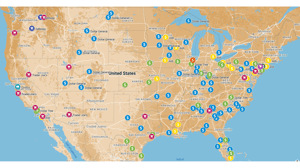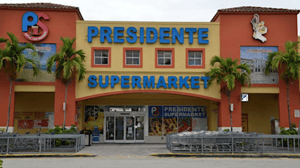GAME SALES HIT $7.4 BILLION IN 1999; PLAYSTATION TOPS
RESTON, Va. -- Video games are hotter than ever, according to a study released last month. Retail sales of console and computer games increased 20.7% in 1999 over 1998, reaching $7.4 billion, said the research firm PC Data, here.Sales of console video game software were 50.5% of the industry's total revenues, at $3.74 billion, while video game hardware accounted for 30.9% of the total and computer
February 28, 2000
DAN ALAIMO
RESTON, Va. -- Video games are hotter than ever, according to a study released last month. Retail sales of console and computer games increased 20.7% in 1999 over 1998, reaching $7.4 billion, said the research firm PC Data, here.
Sales of console video game software were 50.5% of the industry's total revenues, at $3.74 billion, while video game hardware accounted for 30.9% of the total and computer game software was 18.6%, said PC Data. The dominant console platform remained the Sony PlayStation with 47.4% of all hardware units sold and 43.2% of total industry revenue.
This is good news for supermarket retailers, especially those that rent video games, said industry observers. The game rentals that stem from this popularity will help bolster overall video department revenues and also offer sell-through potential, particularly in lower priced game software, they added.
"Growth in 1999 was driven almost entirely by the video game software market, which represented more than half of the combined console and computer game sales," said Matt Gravett, game analyst for PC Data. "The Pokemon phenomenon was a major contributor to growth, as was the introduction of Sega's Dreamcast and the deep discounting of Nintendo's N64 platform."
Increasing 185%, Game Boy platform from Nintendo of America, Redmond, Wash., saw the greatest growth as the result of its late 1998 release of the Game Boy Color system and four very popular Pokemon titles. Revenue for the Game Boy platform products increased 226% over 1998, the company reported.
Nintendo was the leading video game software publisher last year, with all of the top five best-selling video games titles. With 43% of Nintendo's total software sales, the Pokemon franchise boosted Nintendo's unit sales by 46.6%, broadening the publisher's software market share from 22.6% in 1998 to 25.3% in 1999.
As a result, Nintendo's dollar sales went up 29.9%, raising its share of the video game software revenue from 23.6% to 25.5%. The year's top five best-selling video game titles were Pokemon Yellow, Pokemon Blue, Pokemon Red, Pokemon Pinball and Donkey Kong 64.
Sony Computer Entertainment, Foster City, Calif., was the video game industry's second leading publisher in 1999 with 13.9% of unit sales and 17.3% of revenue. Gran Turismo was Sony's top-selling title for the second consecutive year and was the top title on the Playstation platform.
Among others in the top five video game publishers in 1999 were Electronic Arts, Redwood City, Calif., with 10.7% unit share and 11.6% dollar share; Midway Home Entertainment, Corsicana, Tex., with 4.7% unit share and 5.1% dollar share; and Acclaim Entertainment, Glen Cove, N.Y., with 4.3% unit share and 4.7% dollar share.
Sega of America, San Francisco, re-entered the video game market in 1999 with the September release of its Dreamcast system and 11 supporting titles. At the end of the year, it ranked as the thirteenth video game software publisher with 2.6 unit share and 3.5% revenue share.
About the Author
You May Also Like




